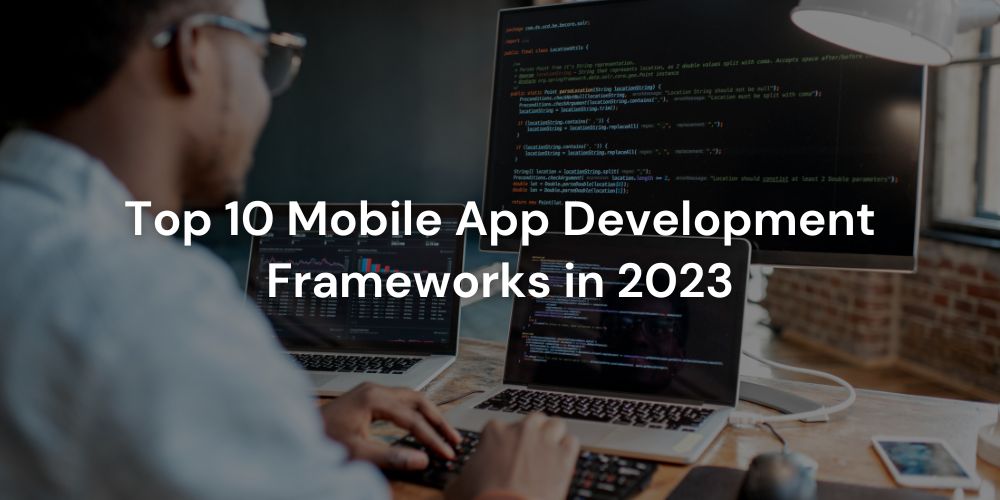Top 10 Mobile App Development Frameworks in 2023

Mobile app development has become an integral part of our daily lives, with apps serving as our gateway to a wide range of services and entertainment. As the demand for mobile apps continues to soar, developers are constantly seeking efficient and effective ways to create high-quality applications. In 2023, the mobile app development landscape has evolved, and several frameworks have emerged as the top choices for building robust and feature-rich mobile applications. In this article, we will explore the top 10 mobile app development frameworks that are making waves in 2023.
Key Mobile App Statistics for 2023
The mobile applicantion development market has experienced remarkable growth over the years, driven by the increasing adoption of smartphones, advancements in technology, and the ever-expanding range of applications across various industries. Here are some statistics that highlight the growth and significance of the mobile app development market:
Global App Revenue: According to Statista, global mobile app revenue is projected to reach $935.2 billion by 2023. This substantial revenue growth reflects the increasing monetization opportunities for app developers.
Number of Mobile Apps: The Apple App Store has 1.96 million apps available for download. There are 2.87 million apps available for download on the Google Play Store. This number has likely continued to increase, demonstrating the proliferation of mobile apps.
App Downloads: In the most recently measured year, consumers downloaded 255 billion mobile apps to their connected devices, up by more than 80 percent from 140.7 billion app downloads in 2016. This figure reflects the growing appetite for mobile apps among consumers.
Mobile App Usage: Users are spending more time on mobile apps. A report by App Annie indicated that in 2020, people spent an average of 3.5 hours per day using mobile apps, a 20% increase from 2019. Mobile users access 9 to 10 apps daily and 30 every month.
Enterprise App Market: The enterprise mobile app market has been expanding steadily. In a report by Grand View Research, the global enterprise mobile app market size was estimated at $128.12 billion in 2020, and it is expected to grow at a CAGR of 11.2% from 2021 to 2028.
Cross-Platform Development: The use of cross-platform development frameworks like Flutter, React Native, and Xamarin is on the rise. These frameworks offer cost-effective and time-efficient solutions for developing apps that work across multiple platforms.
IoT and Mobile Apps: With the increasing adoption of Internet of Things (IoT) devices, mobile apps are becoming the primary interface for controlling and monitoring IoT devices. This trend is expected to contribute to the growth of mobile app development.
AR and VR Apps: Augmented Reality (AR) and Virtual Reality (VR) apps are gaining traction in industries such as gaming, healthcare, and education. The AR market alone is projected to reach $140 billion by 2024, according to MarketsandMarkets.
5G Technology: The rollout of 5G networks is expected to boost the capabilities of mobile apps, enabling faster data transfer, reduced latency, and improved user experiences. This technology is poised to drive innovation in app development.
App Monetization: Mobile app monetization strategies are diversifying. While advertising remains a significant revenue source, in-app purchases, subscriptions, and freemium models are increasingly popular among developers.
App Store Optimization (ASO): ASO has become a critical aspect of mobile app development. According to StoreMaven, optimizing app store listings can result in a 30% increase in app downloads.
Emerging Markets: Developing regions, particularly in Asia and Africa, have witnessed rapid smartphone adoption. This has created opportunities for app developers to tap into these emerging markets.
Security Concerns: With the growing volume of sensitive data handled by mobile apps, security has become a top priority. Developers are investing in robust security measures to protect user information.
Privacy Regulations: Stringent privacy regulations like GDPR and CCPA are shaping the way app developers handle user data. Compliance with these regulations is crucial for app success.
These statistics illustrate the dynamic and expanding nature of the mobile app development market. As technology continues to evolve, mobile apps will play an increasingly central role in various aspects of our lives, and the opportunities for developers and businesses in this market are vast.
Top 10 Mobile App Development Frameworks in 2023
1. Flutter
Flutter, developed by Google, has gained immense popularity in recent years and continues to be a dominant player in the mobile app development arena. It allows developers to build natively compiled applications for mobile, web, and desktop from a single codebase. Flutter’s rich set of pre-designed widgets, hot-reloading feature, and impressive performance make it an ideal choice for cross-platform app development.
One of the standout features of Flutter is its ability to create visually appealing and highly customizable user interfaces. It also offers excellent documentation and a strong developer community, making it easier for developers to get started and find solutions to their queries.
2. React Native
React Native, developed by Facebook, remains a strong contender in the world of mobile app development. It allows developers to build mobile applications using JavaScript and React, and it provides a native-like experience on both iOS and Android platforms. React Native’s component-based architecture and extensive library of pre-built components simplify the development process and reduce development time.
The framework’s ability to share a significant portion of code between platforms, along with its robust community and third-party libraries, make it a popular choice among developers and businesses looking to create cross-platform apps.
3. SwiftUI
For iOS app development, SwiftUI is a game-changer. Introduced by Apple, SwiftUI offers a modern and declarative approach to building user interfaces for iOS, macOS, watchOS, and tvOS applications. With SwiftUI, developers can write less code while achieving a high level of interactivity and fluidity in their apps.
SwiftUI integrates seamlessly with Swift, Apple’s programming language, and provides a real-time preview feature, making it easier for developers to see the changes they make in code reflected in the app’s user interface instantly. As SwiftUI continues to evolve, it remains a top choice for Apple ecosystem app development in 2023.
4. Kotlin Multiplatform Mobile (KMM)
Kotlin Multiplatform Mobile, or KMM, is an emerging framework that focuses on code sharing between Android and iOS platforms. Developed by JetBrains, KMM leverages the Kotlin programming language to enable developers to write shared business logic, data models, and networking code while still maintaining platform-specific user interfaces.
KMM simplifies the development process by offering a unified codebase for both platforms, reducing duplication of efforts and speeding up development. As Kotlin gains popularity in the Android community and beyond, KMM is poised to become a preferred choice for cross-platform mobile app development.
5. NativeScript
NativeScript is an open-source framework that allows developers to build truly native mobile apps using JavaScript, TypeScript, or Angular. It provides direct access to native APIs, ensuring that developers can achieve the highest level of performance and user experience on both iOS and Android devices.
One of NativeScript’s strengths is its vast ecosystem of plugins and modules, which extend the framework’s capabilities and simplify the integration of third-party services. With the ability to create native UI components, NativeScript offers the flexibility and power needed for complex mobile app projects.
6. Xamarin
Xamarin, a Microsoft-owned framework, enables developers to build cross-platform mobile apps using C# and the .NET framework. It provides a single codebase that can be used to target multiple platforms, including iOS, Android, and even macOS.
Xamarin offers a robust set of tools, including Xamarin. Forms for building shared user interfaces and Xamarin.Essentials for accessing device-specific functionality. Its integration with Visual Studio and support for Microsoft Azure cloud services make it a compelling choice for enterprises and developers invested in the Microsoft ecosystem.
7. Ionic
Ionic is a popular open-source framework for building cross-platform mobile and web applications using web technologies such as HTML, CSS, and JavaScript. It offers a wide range of pre-designed UI components and a flexible theming system, making it easy for developers to create visually appealing apps with a native look and feel.
One of the standout features of Ionic is its ability to generate progressive web apps (PWAs) alongside native mobile apps, providing a seamless user experience across different platforms. Ionic’s community-driven development and extensive documentation make it accessible to developers of all skill levels.
8. PhoneGap / Apache Cordova
PhoneGap, also known as Apache Cordova, is a well-established open-source framework that enables developers to build mobile apps using web technologies. It provides a bridge between web code and native device APIs, allowing developers to access device features like the camera, accelerometer, and geolocation.
While PhoneGap has been around for some time, it remains a reliable choice for cross-platform development. It offers a wide range of plugins and extensions, and its compatibility with various web development frameworks, such as Angular and React, ensures flexibility and ease of use.
9. Appgyver
Appgyver is a low-code platform that empowers developers and business professionals to create mobile apps without extensive coding knowledge. It offers a visual development environment where users can design and build apps through a drag-and-drop interface and configure logic using a visual flow editor.
Appgyver’s focus on rapid development and its extensive library of pre-built components make it an attractive option for businesses looking to streamline their app development processes. While it may not be as flexible as traditional coding approaches, it offers a unique and efficient way to create mobile apps.
10. Framework7
Framework7 is an open-source framework for building iOS and Android apps with HTML, CSS, and JavaScript. It is designed with a focus on simplicity, performance, and native-like user experiences. Framework7 provides a wide range of UI components, animations, and features, making it a versatile choice for app development.
One of the key strengths of Framework7 is its ability to create apps that closely resemble native iOS and Android apps, thanks to its built-in Material Design and iOS themes. It’s particularly suited for building mobile apps that require a high level of customization and control over the user interface.
Read more: Ruby on Rails Framework Overview 2023
Conclusion
In 2023, the landscape of mobile app development is filled with a wide array of frameworks catering to different needs and preferences. The choice of a mobile app development framework depends on factors such as the target platforms, development team’s expertise, project requirements, and business goals. Each of the frameworks mentioned in this article has its own set of advantages and use cases, and the right choice will ultimately depend on the specific needs of your project.
As technology continues to advance, it’s essential for developers and businesses to stay up-to-date with the latest trends and innovations in mobile app development. By choosing the right framework and adopting best practices, you can create high-quality, user-friendly mobile apps that stand out in the competitive app market of 2023 and beyond.
Consider Bestarion for Your Mobile App Development Projects
Bestarion offers tailored mobile app development services to bring your app idea to life. Our expert team specializes in crafting tailored mobile applications, whether you’re aiming to disrupt the market with an innovative concept or enhance your business’s reach. Bestarion prioritizes user-centric design, ensuring a seamless and engaging experience for your audience. With a commitment to efficiency, quality, and scalability, we deliver on-time and bug-free apps that evolve with your success. Our continuous support and competitive pricing make us the ideal partner to bring your app vision to life and thrive in the competitive app ecosystem.
We’re here to guide you every step of the way, from concept to deployment, and beyond. Together, let’s create an app that users can’t resist and competitors envy. Don’t wait—reach out today, and let’s turn your app idea into reality! Your users are waiting, and we’re ready to make it happen.


